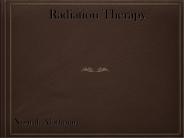Radiation Therapy For Brain Tumor PowerPoint PPT Presentations
All Time
Recommended
Brain Tumor Excision Of Brain Tumor
| PowerPoint PPT presentation | free to download
Proton Therapy for Pediatric Brain Tumors Nancy J. Tarbell, ... Review potential benefits of protons Clinical protocols using protons Review- What have we learned to ...
| PowerPoint PPT presentation | free to view
Discuss system of classifying brain tumors. ... Cerebral angiography. EEG. Cytologic studies of CSF. Medical Management Brain Tumor. Chemotherapy ...
| PowerPoint PPT presentation | free to view
... principles Interaction of radiation and tissues Fractionation Brachytherapy Indications for treatment of head and neck tumours ... Carcinoma of salivary gland ...
| PowerPoint PPT presentation | free to download
Brain Tumor Update Genomics and Targeted Therapy For Malignant Gliomas Hassan FathallahShaykh, M'D',
| PowerPoint PPT presentation | free to view
Samuel T. Chao, M.D.1,3; Gene H. Barnett, M.D. 2,3; Steven A. Toms, M.D., M.P.H. ... 1; Alwyn M. Reuther, M.P.H.1; Ethan M. Katz, M.S. 4; and John H. Suh, M.D. 1,3 ...
| PowerPoint PPT presentation | free to view
Radiation Therapy Nourah Alothman
| PowerPoint PPT presentation | free to download
... Brain Metastasis The most common direct neurological complication of Systemic cancer BMprimary malignant brain tumor 10 times Prostate cancer 1%BM ...
| PowerPoint PPT presentation | free to view
Malignant gliomas are the leading cause of death in children ... CAT Scans. MRI. Surgical biopsy. Treatments. Open Surgery. Stereotactic Surgery. Chemotherapy ...
| PowerPoint PPT presentation | free to view
HRQOL: TMZ vs PCB for recurrent GBM: Osoba et al. JCO 2000. TMZ in Newly Diagnosed GBM: Stupp NEJM 2005. Stupp NEJM 2005. PFS Benefit. OS Benefit ...
| PowerPoint PPT presentation | free to view
... lasics Seizure medicines Narcotic analgetics teratoma. Glioblastoma multiforme large orbital optic glioma in 5-year-old child with neurofibromatosis type 1.
| PowerPoint PPT presentation | free to view
Image-guided radiation therapy (IGRT) is the use of imaging during radiation therapy to improve the precision and accuracy of treatment delivery. IGRT is used to treat tumors in areas of the body that move, such as the lungs. Radiation therapy machines are equipped with imaging technology to allow your doctor to image the tumor before and during treatment.
| PowerPoint PPT presentation | free to download
Pediatric brain tumors are a significant health concern, affecting thousands of children worldwide. These tumors, although relatively rare compared to adult brain tumors, pose unique challenges due to the delicate nature of the developing brain. Early detection, accurate diagnosis, and effective treatment strategies with brain tumor specialist are crucial for improving outcomes and enhancing the quality of life for these young patients.
| PowerPoint PPT presentation | free to download
40% of posterior fossa tumors. Medulloblastoma ... 70% occur in the posterior fossa ... Posterior fossa-symptoms and signs for hydrocephalus. ...
| PowerPoint PPT presentation | free to view
Brain tumors are tumors that form in the brain substance, the supporting tissues or the covering within the skull and are often treated with the help of various surgical procedures. The brain tumor treatments in India costs are low while the success rates are at par with international standards.
| PowerPoint PPT presentation | free to download
According to the National Brain Tumour Society, an estimated 688,000 plus people are living with a primary brain or Central Nervous System (CNS) tumor. Brain tumors generally occur in supportive brain tissues. The exact cause of brain tumor is not yet known, and it can occur in any age group. A brain tumor is an abnormal and uncontrolled proliferation of cells in the brain. It can be benign or malignant. Brain tumor arises from brain tissue and rarely spreads. The tumor eventually compress and damage other structures in the brain.
| PowerPoint PPT presentation | free to download
Temozolomide (TMZ) development for glioma ... Addition of TMZ to radiotherapy prolongs survival ... TMZ is safe and well tolerated ...
| PowerPoint PPT presentation | free to view
67 year old woman presented with partial complex seizures and ... eg, moderate dysphasia, moderate paresis, or visual disturbances such as field defect ...
| PowerPoint PPT presentation | free to view
Searching for the best brain tumor treatment in India? Med Tour Advisors, India's thriving healthcare sector is home to some of the most advanced medical technology and equipment.
| PowerPoint PPT presentation | free to download
Brain tumor is one of the serious health issue, know here the different types of brain tumor and how it is treated according to stages and type. http://www.myhealthpharma.com/blog/things-to-known-about-brain-tumor.aspx
| PowerPoint PPT presentation | free to download
Brain tumor is one of the serious health issue, know here the different types of brain tumor and how it is treated according to stages and type. http://www.myhealthpharma.com/blog/things-to-known-about-brain-tumor.aspx
| PowerPoint PPT presentation | free to download
Cyberknife treatment and Surgery with Laser / Radiation therapy in India, lung cancer treatment in delhi, brain tumor treatment in india, brain tumor surgery in india, spine treatment in delhi, treatment for cancer in delhi, brain tumor treatment in delhi, brain tumor surgery in delhi, breast cancer treatment in delhi prostate cancer treatment in delhi, prostate cancer treatment in india, lung cancer specialist in delhi, breast cancer doctor in delhi, cost cyberknife treatment india, cyberknife therapy in india, Radiation therapy in India
| PowerPoint PPT presentation | free to download
Brain Tumors in Pediatrics Resident Education Lecture Series Brain Tumors - Background 20-30% of cancers in children 2500-3000 new diagnoses/year 2nd most common ...
| PowerPoint PPT presentation | free to view
Brain tumors are tumors that form in the brain substance, the supporting tissues or the covering within the skull and are often treated with the help of various surgical procedures. The brain tumor treatments in India costs are low while the success rates are at par with international standards.
| PowerPoint PPT presentation | free to download
Neurosensory: Stroke and Brain Tumors Part #1 Stroke (Brain attack/CVA) A. Pathophysiology/etiology Normal brain physiology and stroke Ranks 3rd as cause death Blood ...
| PowerPoint PPT presentation | free to view
Cancer hospital in Houston offers a brain cancer treatment with an award-winning cancer specialist in Houston. For a brain tumor, Houston cancer hospital’s oncologist creates a team with the different oncologist and makes an opinion to provide the best treatment. Cancer treatment centers in Houston teams include a variety of other health care professionals, oncology nurses, social workers, pharmacists, counselors, dietitians, and others. Learn more about brain tumor or cancer, types of brain cancer, symptoms of brain cancer, causes of brain cancer, Stages of brain cancer, Treatment, and a side-effect of brain cancer and important precaution of brain cancer with cancer center in Houston Texas.
| PowerPoint PPT presentation | free to download
Dushyant Verma Maharani Bagh - A brain tumor is a mass or growth of abnormal cells in the brain. Brain tumors can be benign (non-cancerous) or malignant (cancerous). Most brain tumors are benign, meaning they are not cancerous and do not grow or spread to other parts of the brain or body. However, some brain tumors can be malignant, meaning they are cancerous and can grow and spread to other parts of the brain or body.
| PowerPoint PPT presentation | free to download
Combined results from trials including a total of 199 cases ... . 5 published reports out of 43 patients, only 6 failed and required a laryngectomy, ...
| PowerPoint PPT presentation | free to download
Title: Back to basics Cancer: Cancer is a term used for diseases in which abnormal cells divide without control and are able to invade other tissues.
| PowerPoint PPT presentation | free to download
A brain tumor is a growth of abnormal cells in the tissues of the brain. Brain tumors can be benign, with no cancer cells, or malignant, with cancer cells that grow quickly.
| PowerPoint PPT presentation | free to download
Surgery is the primary treatment for brain tumors that can be removed without causing severe damage. Many benign (non-cancerous) tumors are treated only by surgery. Dedicated & Eminent Surgeons. Know more about the treatment options and cost! Experienced Surgeons with Best post-op care and Dedicated Neurosurgical team! Call us at : 8010335566 for more details.
| PowerPoint PPT presentation | free to download
1946: Robert Wilson (Harvard) proposed use of protons in treating tumors ... CERN Courier, vol 38, no 9 [physics/0004015] Positron Emission Tomography ...
| PowerPoint PPT presentation | free to download
In this article, you will know what is a brain tumor, what causes it, about the brain tumors symptoms, types, diagnosis, and treatment.
| PowerPoint PPT presentation | free to download
Benign brain tumours are abnormal collections of cells that reproduce slowly and usually remain separate from the surrounding normal brain.To know more about Cervical cancer see this link http://www.indiacarez.com/brain_cancer_tumour_treatment_in_india.html
| PowerPoint PPT presentation | free to view
CT abd/chest, CXR, U/S with IVC Doppler, U/A, catechols. Surgical approach ... testes - inguinal incision with high ligation of spermatic cord - remove even if ...
| PowerPoint PPT presentation | free to view
Medically, it is believed that the signs and symptoms of brain tumor of the brain do vary as a result of location, size and the growth rate of the tumor.
| PowerPoint PPT presentation | free to download
An Overview of Radiation Therapy for Health Care Professionals American Society for Radiation Oncology
| PowerPoint PPT presentation | free to view
1. Technical aspects of radiation delivery including IMRT ... 3D Dosimetry. IMRT Dosimetry. IMRT Dosimetry Prostate Cancer. Prostate IMRT Post-Prostatectomy ...
| PowerPoint PPT presentation | free to view
dose response: mean dose, max dose, ...? challenges. data uncertainties. terra incognito. modeling vs. dose metrics. Tradeoffs in IMRT P' Outline [2/2] ...
| PowerPoint PPT presentation | free to view
Pediatric Brain Tumor Market Research Report, Forecast Period 2017-2023. The Global Market is based on Industry Size, Share, Trend and Growth. Also, the industry insight includes regional and segmental shares, the report is published by MRFR.
| PowerPoint PPT presentation | free to download
Gamma knife radio surgery is a non-invasive procedure to treat benign and malignant brain tumors. The procedure involves operating on the diseased brain tissue by directing highly-focused beams of ionizing radiation with high precision. The precise dosage of radiation destroys intra-cranial as well as extra-cranial tumors and other lesions that are inaccessible for open surgery. There are many nervous diseases for which conventional surgery is inadvisable because of damage to the nearby arteries, veins and vital structures.
| PowerPoint PPT presentation | free to download
Brain Tumors An Overview of Epidemiology, Treatment and Prognosis Dima Suki, PhD, CCRP Professor Director of Data Management Co-Director of Clinical Research
| PowerPoint PPT presentation | free to view
Adjusting Radiation Therapy to Improve Outcomes Protectors, Sensitizers andor Mega Doses
| PowerPoint PPT presentation | free to view
Title: Domains of Cognitive Functioning Author: Unknown User Last modified by: Natalie S.A. Tooch Created Date: 2/15/2004 10:26:35 PM Document presentation format
| PowerPoint PPT presentation | free to view
imaging brain tumors in newborns and early childhood: utility of combining mr techniques m. mortilla, m. antonello, c. cesarini, l. tasciotti, c. fonda
| PowerPoint PPT presentation | free to view
Intensity-Modulated Tomotherapy with Stereotactic Radiosurgery for ... These image sets (CT/MRI and CT/ MET-PET) were then fused utilizing the Pinnacle System. ...
| PowerPoint PPT presentation | free to view
Fms-like tyrosine kinase 3 ligand (Flt3L) Toll-like receptors (TLR) ... The Australian Naturopathic Network. Revised 5/18/2002. ...
| PowerPoint PPT presentation | free to view
Time frame of study - January 2002 June 2005. ... Hypopharynx2 year est. 2-yr Overall Survival - Larynx vs. Hypopharynx Patients (CCRT only) ...
| PowerPoint PPT presentation | free to view
Discuss the goals,principles and purposes of Radiation Therapy. Discuss common site specific side effects for patients receiving RT and self ... Brachytherapy ...
| PowerPoint PPT presentation | free to view
... adults will be a childhood cancer survivor ... unrelated to cancer. Limited learning ... Supported by American Cancer Society. Research Scholar Grant ...
| PowerPoint PPT presentation | free to view
Endpoints for Pediatric Brain Tumors. December 6, 2006 ... Brain tumor workshop ... 29 patients with recurrent brain stem glioma and 34 patients with ...
| PowerPoint PPT presentation | free to view
15 x 15 (cm) Percentage Relative Dose. Dmax ... X Ray contamination generated by electrons stopped in filters , Air, Water. 110. 100 ...
| PowerPoint PPT presentation | free to view
Determine the incidence of stroke among survivors of childhood leukemia and brain tumors ... Brain tumor survivors. Siblings of cancer survivors ...
| PowerPoint PPT presentation | free to view
brain tumor is an abnormal growth of cells in the brain. Tumors can be either cancerous (malignant) or non-cancerous (benign). Cancerous tumors grow and spread aggressively, potentially invading nearby tissues and spreading to other parts of the body, while non-cancerous tumors are usually less aggressive and tend to stay contained within the brain. Brain tumors can cause a variety of symptoms depending on their size and location, including headaches, seizures, changes in vision or hearing, difficulty with balance or coordination, and changes in mood or personality. Treatment options for brain tumors may include surgery, radiation therapy, and chemotherapy, and the choice of treatment will depend on the type and location of the tumor, as well as the overall health of the patient.
| PowerPoint PPT presentation | free to download
Radiation therapy is a procedure entailing the precise delivery of high doses of radiation to tumors and other relevant anatomical targets. Gamma Knife radiosurgery is a major form of radiation therapy. It is mainly used to treat brain tumors, arteriovenous malformations, trigeminal neuralgia, acoustic neuroma, and pituitary tumors.
| PowerPoint PPT presentation | free to download
The CyberKnife system is a form of robotic radiosurgery used to treat both malignant and benign tumors in all areas of the body. The advantages to the CyberKnife system is that it provides a more targeted and precise form of treatment than other radiation therapies, it is relatively non-invasive, and it eliminates the need for the rigid head frame needed in other brain surgery procedures. CyberKnife is also an outpatient surgery that requires no incision, is painless, and requires little recovery time for the patient making it a quick and minimally distressing treatment for the patient. Using image guided technology continuously throughout the process, the CyberKnife system is able to accurately target tumors with radiation produced from a small linear particle accelerator. This particle accelerator is attached to a robotic arm with enough freedom of movement to be able to reach any targeted area of the patient’s body.
| PowerPoint PPT presentation | free to download
























































